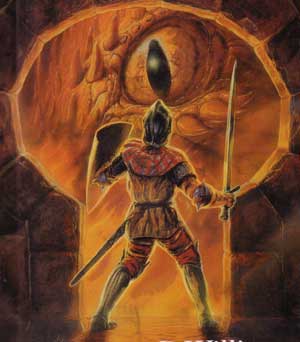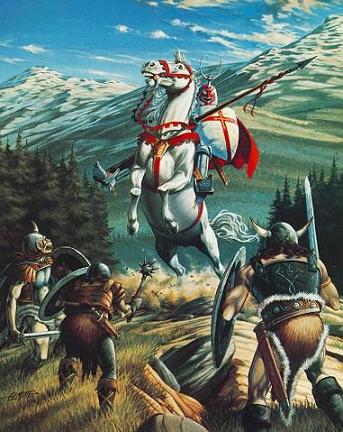|
Is D&D Evil? - An Educated & Enlightened Rebuttal

By Charles Alexander Moffat
According to a number of right-wing religious folks Dungeons and Dragons is "evil" and parents should keep their children away from it. But is Dungeons and Dragons actually evil?
The Short Answer?
No.
The Long Answer?
Absolutely, fundamentally not evil.
And here is why:
Dungeons and Dragons (commonly known as D&D or DnD) is a roleplaying game similar to Final Fantasy and other computer-based games, except that D&D is based upon rolling twenty-sided dice to determine spells, attacks, etc instead of a computer. It is dramatically more complex than playing Monopoly and allows for the players to create characters using their imaginations. Playing the game itself is basically interactive storytelling, is played by a small group of people (usually 4-6 friends) and is much akin to the "Choose Your Own Adventure" children's books.
So are children's books about knights fighting dragons evil? No. Is computer games about wizards fighting monsters/demons evil? No. So is a roleplaying game about knights and wizards who fight dragons/monsters/demons evil? No, absolutely not.
The 20-sided dice used in the game are commonly known as a "d20". There are numerous other d20 System games such as Star Wars, Star Trek and even The Matrix. Curiously, only D&D has been called evil by right-wing religious fundamentalists. Nobody has dared call Star Wars, Star Trek or The Matrix evil.
Many adults play D&D. Why? Because the game involves a lot of math. During the average four hour game a single player adds and subtracts (and sometimes even multiples and divides) anywhere from between 10 to 200+ times, depending on what is happening in the game. It is actually quite a good game for teaching basic math skills.

Here is an example:
Sir Agathor (played by Bob) is attacked by a red dragon who is threatening to burn down Sir Agathor's church. Sir Agathor swings his sword (Bob rolls a d20) and rolls a 18. Sir Agathor has a +2 bonus on his strength and is carrying a magical +2 longsword. Because he has a +2 strength and a +2 sword, he gets +4 to hit the dragon. 18+4 = 22. This particular dragon gets hit whenever someone rolls a 19 or higher. Voila! Sir Agathor hit the dragon... his longsword does 5 points of damage +2 for his strength and another +2 for his magical sword. The dragon takes 9 points of damage total, but is not dead and can still burn poor Sir Agathor to death with his fiery breath.
Note how in one swing Bob ended up having to do addition 4 times just to determine whether Sir Agathor hit the dragon and how much damage he did. In game time, this takes about 4 seconds. Imagine for a moment how many times a player ends up using math during a single hour?
D&D also requires a lot of imagination and storytelling skill. A player who just sits there and doesn't join in the story is going to get bored. It is much more fun if Bob's character Sir Agathor walks up to the huffing and puffing dragon, looks him in the eye and says "You'll burn down my church over my dead body! En garde dragon! Prepare to meet your maker!" and then Sir Agathor draws his sword and attacks.
D&D is not an atheist game, but nor is it religious. Because the characters in the story are usually knights or clerics there is actually positive reinforcement for a higher being or "God". Much of the complaints that D&D is evil dates back to a book first published in the 1980s called "Deities & Demigods", a statistics book for monsters, demons, evil demi-gods, etc. that the characters in the story usually fight/destroy. Again, that is positive reinforcement for religion because the characters are destroying the demons in the story. The overly religious folks who saw the title of the book got upset over nothing, didn't stop to even try to understand what D&D actually is and started comparing D&D to satanic cults. It is ridiculous to even make such a comparison.

Do you have to join a cult to play D&D? No. D&D has nothing to do with cults or any kind of real religion. The people who play D&D are pretty normal people, sometimes a bit nerdish, and many players will often make some kind of Star Wars or Star Trek joke sometime during the game. "Hey, stop doing that voice! You sound like Yoda!"
Some religious groups regularly spread lies about D&D, claiming it involves satanic rituals. There are absolutely no rituals involved in D&D. It is just a game people play for fun. Anyone who tells you that it involves "rituals" or any kind of satanism is either misinformed or is a religious bigot who is outright lying to you.
Because D&D is usually played by nerdish people, it is "different" and people are often afraid of things that are different. The colour of people's skin, their choice of religion, whether or not they grow a beard or sometimes just because they are female. Racism, sexism, religious bigotry are all related to the fear of the unknown. Conservative religious folks are scared of D&D because they don't understand it or anything else that is fantasy related.
No one has EVER committed suicide because of a D&D game. That is more utter nonsense and lies from religious wackos. That is as ridiculous as saying "Watching Harry Potter will make you jump off a cliff on a broom in an attempt to fly." No one is that gullible or stupid. Not even children are that dumb.
Lord of the Rings, Harry Potter and other fantasy icons have also been attacked in the past by religious groups who claim that "fantasy movies are evil". Anyone who has ever seen a fantasy movie or played D&D knows it isn't evil and would never say such a ridiculous thing. Sometimes religious fanatics will even claim to be former D&D players, at which point they seem to have forgotten one of the ten commandments: Thou shalt not lie.

Women also play D&D. Roughly 33% of D&D players are women. Because the vast majority of players are male however there does tend to be art that is produced that looks quite sexual and could certainly be described as sexist, but no more sexist than an issue of Vogue or Cosmopolitan. So before you ask is fantasy art evil, ask yourself is Vogue and other women's magazines evil? No. They are sexual yes, but so is most advertising we see anyway. Even crucifixes with Jesus Christ on them are a little sexual because he is almost nude.
A lot of people play D&D. There are over 36 million D&D players in the United States alone and an estimated 200 million players worldwide. Its popularity has been growing dramatically in recent years as the game is being translated into a multitude of languages and sold overseas.
So in conclusion Dungeons and Dragons is a popular game played by men and women around the world. It is not a cult or a religious group. No one has ever been injured while playing D&D (although quite a few fictional dragons and monsters have been destroyed). The game is more for adults and requires math and imagination to play. It most certainly is not evil or dangerous. Quite the opposite, D&D is a fun and entertaining game. I fully intend to teach it to my children when they are learning math in school, and I know that they will grow up to be fully-rounded adults with fabulous imaginations.
But best of all my children won't be gullible when it comes hearing lies. They will be smart and think for themselves.
|
|
|
Indie bookshop ArcaneTomes.org is an online fantasy bookstore that caters solely to indie fantasy books.
Don't waste time browsing brick and mortar bookstores for books that don't match your reading needs. Instead satisfy all of your fantasy book reading needs by browsing books by a variety of indie authors and find books that you won't be able to find in a normal bookstore.
|
|
|



